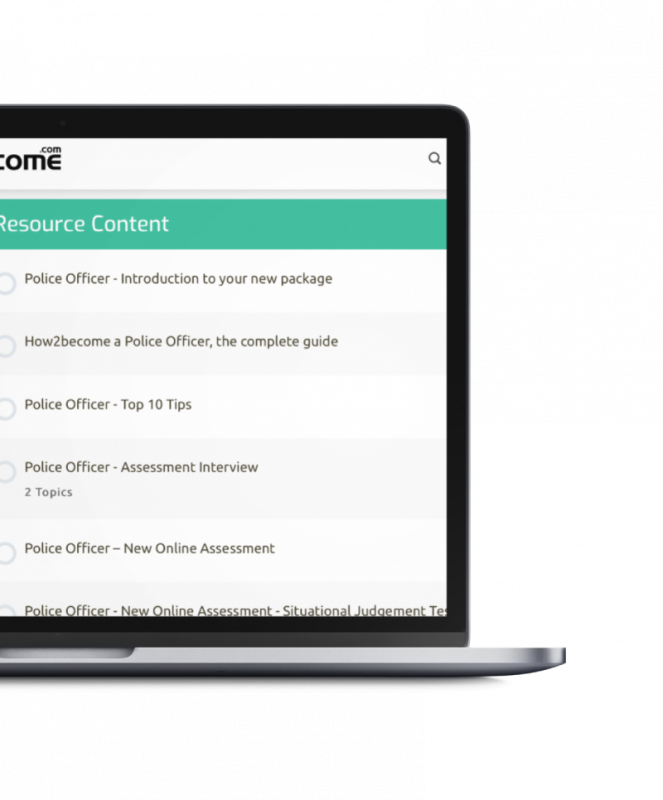
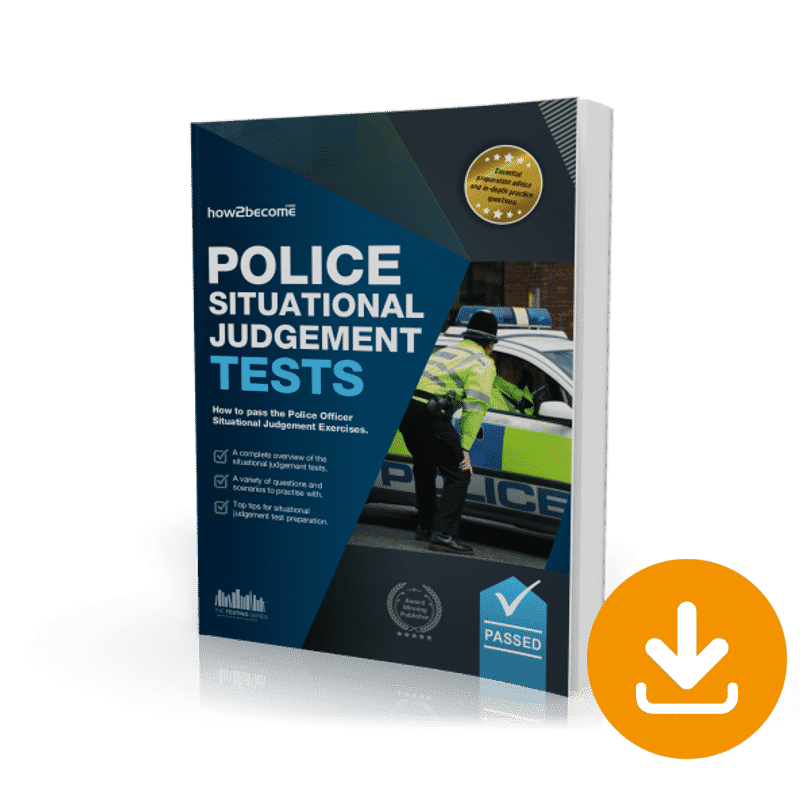
POLICE SJT QUESTIONS & ANSWERS
100s of practice questions proven to help you pass your police situational judgement test first time.
Start Preparing Now 👉Worth every penny as it prepares for you the style and format of questions that you will be facing during the process of becoming a PC.”
TrustPilot
Practice Material That Works
Discover insider secrets and a masterclass of Police Officer SJT practice material that has helped 100s of candidates pass their police tests.
Unlock Your Potential
Whether you’re just starting out or you know what to expect, you will get access to 100s of questions, fully-worked solutions that will catapult your chances of success.
Powerful Resources
Get instant access to the material right now which includes fully worked explanations to each situational judgement test question.
PRACTICE POLICE situational judgement TESTS
In order to become a police officer, every constabulary will require you to take some form of situational judgement test, as part of the initial SIFT. Whilst the selection process for becoming a police officer is highly competitive, there are a number of things that you can do to increase your chances of success.
The guide itself has been split up into useful sections to make it easier for you to prepare for the test. Don’t ever give up on your dream; if you want to become a police officer, then you CAN do it. The way to approach an application for a job of this nature is to embark on a programme of ‘in-depth’ preparation, and this guide will show you exactly how to do that.
*UP TO DATE FOR 2025*
How2Become’s testing resource has been updated to include the latest police recruitment information, and sample questions for the new national SIFT process, introduced in November 2021 by the College of Policing and the subsequent updates for 2025. The national SIFT includes the following: a situational judgement test (SJT) and a behavioural styles questionnaire.

ABOUT THE POLICE OFFICER SITUATIONAL JUDGEMENT TESTS
Before we tell you more about how our resource will help you to pass the police situational judgement test, let’s first recap on what the tests actually involve:
Police constabularies in the UK now use situational judgement tests as part of the assessment criteria for new recruits. Another name for this type of test is the ‘PSJT’. The PSJT was introduced as an additional way to help constabularies assess the decision-making of potential officers, and measure how your decisions match up to the core police expectations.
The purpose of this resource is to provide you with some invaluable sample questions that will help you prepare for the real test. Within our guide, we have provided you with different types of situational judgement test questions; ones which are police officer related, and ones which are not police officer related – and are therefore ‘generic’ in nature. The reason for the different types of questions is simple. We want you to experience alternative types and formats of situational judgement questioning prior to sitting your SJT. This will enable you to be better prepared for the test itself.
On that basis, make sure you attempt and understand each type of question format before you attend your online assessment.
THE PURPOSE OF THE SITUATIONAL JUDGEMENT TEST
As you will be fully aware, the police service has an excellent reputation, and therefore it’s paramount that they are hiring individuals with good decision making skills. This form of situational judgement test has been used for many years in other safety-critical roles, such as the fire service. It’s an established and reliable way of separating good candidates from bad candidates, so you need to make sure that you
are in the former category!
The questions are usually presented in the same format. You are required to read a short passage, and will then be presented with four options. It is your job to separate the options into the following categories:
- EFFICIENT. The most reliable, productive response, which is most likely to lead to a good result.
- FAIRLY EFFICIENT. A reliable and productive response, albeit one which could possibly be improved upon, via small changes in action.
- INEFFICIENT. A response which does not resolve or simply ignores the issue at hand.
- COUNTERPRODUCTIVE. A response which makes the situation worse, rather than better.
Although the police situational test is not perfect, it is generally a very reliable indicator of how an officer would act in a particular situation. Of course, it’s very difficult to replicate potentially high pressured situations in test format. However, the assessment is taken under timed conditions, which adds its own element of pressure for you to overcome.
Check out our guide, for a full overview of how to link the core competencies!
TIPS FOR PASSING THE POLICE SITUATIONAL JUDGEMENT TEST
There are several things you can do in order to help improve your scores during the PSJT. The following tips will help you to prepare effectively and improve your overall ability to pass this type of psychometric test:
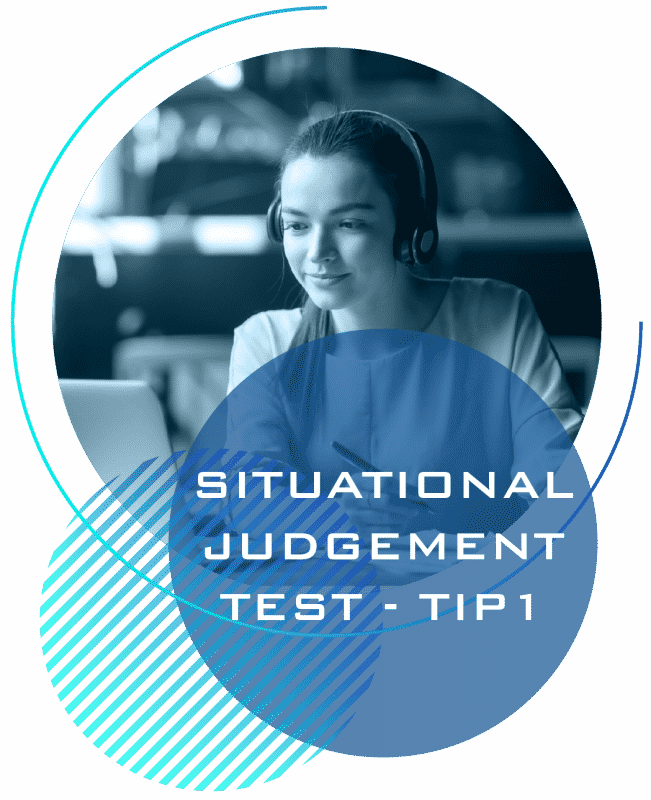
Situational Judgement test – TIP 1
There are many types of situational judgement tests available on the market. Just because you are applying to become a police officer, doesn’t mean you should focus solely on police officer related SJTs. Obtain as many SJT questions as possible, from a variety of different genres, and practise accordingly.
SITUATIONAL JUDGEMENT TEST – TIP 2
When you read the question, you will be presented with a ‘situation’. Read the situation quickly before scanning each of the presented options. Look for the safest option first, and then look for the option you would be least likely to carry out at all. Then, assess the final two options and place them in order of priority based on what you would do in that type of situation.
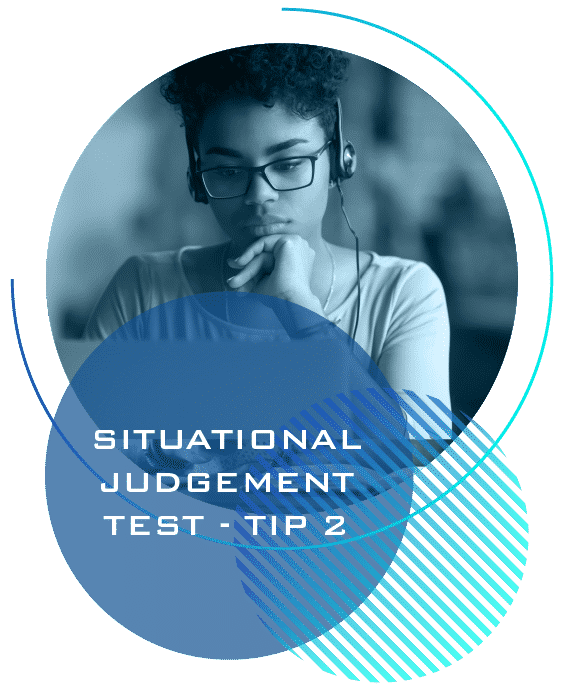
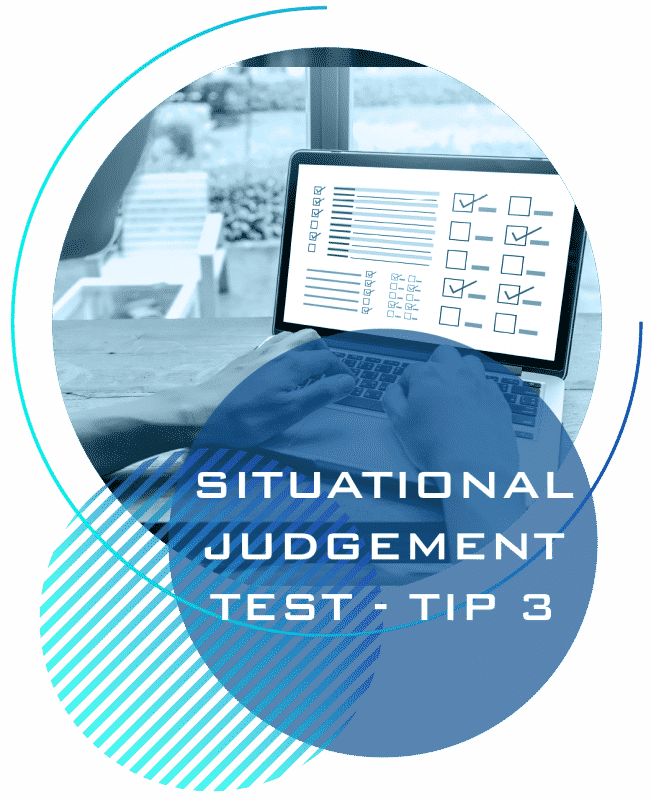
SITUATIONAL JUDGEMENT TEST – TIP 3
You do not need to be a police officer in order to pass the police officer related situational judgement test questions provided within this book. What you do need to be is professionally conscious, and have a good level of common sense. When assessing the situation and presented options, always err on the side of caution. Don’t take silly risks.
SITUATIONAL JUDGEMENT TEST – TIP 4
THE VERBAL ABILITY TEST IS designed to examine your ability to extract the correct information from a passage of text or scenario. Each question will have three possible answers: true, false or impossible to say. Your task is to mark each answer if you believe it is true, false or impossible to say based on what you have read. A vital tip for this test is to remember to only go by what is written in the passage and not what you know to be true in reality. The test will consist of 28 questions and you will have 30 minutes ti complete.
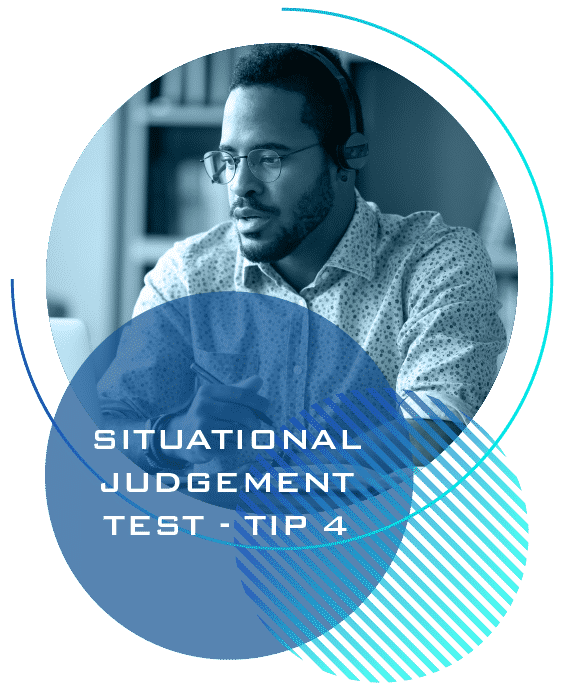
Sample Police Situational Judgement Question
The following is a sample PSJT question for you to try. Following the question is a breakdown of how the answer has been reached.
Sample Question
You are sitting in the staff canteen, when three other members of the constabulary sit down at your table. As you engage in friendly discussion with them, two of the members begin to mock the other person for his religion. Although they are only joking, you can see that the individual in question has been upset by these comments.
1. Join in, it’s just a bit of banter.
Efficient / Fairly Efficient / Inefficient / Counterproductive
2. Speak up, and inform your colleagues that they should have more respect for other religions.
Efficient / Fairly Efficient / Inefficient / Counterproductive
3. Ask the offended colleague to speak to you in private afterwards, where you will discuss the comments.
Efficient / Fairly Efficient / Inefficient / Counterproductive
4. Try to change the subject.
Efficient / Fairly Efficient / Inefficient / Counterproductive
Whenever you are answering this type of police situational judgment
question, always try to focus your answer around the core competenciesof the police.
1. ‘Join in, it’s just a bit of banter.’
Answer: Counterproductive
Explanation: This is a counterproductive response. Religion is not something that should be mocked, and you can clearly see that the individual in question has taken the remarks badly.
2. ‘Speak up, and inform your colleagues that they should have more respect for other religions.’
Answer: Efficient
Explanation: This is an efficient response, as you are clearly demonstrating to the affected individual that discrimination of any kind will not be tolerated, as well as admonishing your colleagues for their behaviour.
3. ‘Ask the offended colleague to speak to you in private afterwards, where you will discuss the comments.’
Answer: Fairly Efficient
Explanation: This response is fairly efficient. You are showing your colleague that discrimination is not acceptable, but at the same time you are not demonstrating this to the individuals who have upset him.
4. ‘Try to change the subject.’
Answer: Inefficient
Explanation: This is an inefficient response. You need to make sure that the problem is addressed.
Sample Police Situational Judgement Test Questions
To help you get a better understanding of the police officer SJT, let’s take a quick look at a few sample questions.
You are policing a local shopping centre. As you are walking past a clothing shop on the top floor, a man comes running past you at full speed. He knocks into you and falls to the ground. As he falls, he drops the bag in his hand, and a t-shirt falls out. You notice that the t-shirt still has the magnetic store tag on it.
Man: ‘Sorry mate, didn’t see you there! Must dash!’
1. Help the man to his feet, put the t-shirt back in his bag for him and
wish him a good day.
Efficient / Fairly Efficient / Inefficient / Counterproductive
2. Help the man to his feet, but examine the t-shirt, before questioning
the man on where he got it from.
Efficient / Fairly Efficient / Inefficient / Counterproductive
3. Ask the man to come with you to the security office, so that you can
investigate further.
Efficient / Fairly Efficient / Inefficient / Counterproductive
4. Pin the man to the floor and proceed to arrest him.
Efficient / Fairly Efficient / Inefficient / Counterproductive
Q1.
1.Help the man to his feet, put the t-shirt back in his bag for him and wish him a good day.
Answer: Inefficient
Explanation: The reason that this answer is inefficient, is that you are not resolving the issue. Instead, you are simply ignoring it and letting the man leave.
2. Help the man to his feet, but examine the t-shirt, before questioning the man on where he got it from.
Answer: Fairly Efficient
Explanation: The reason that is answer is fairly efficient, is that you are taking steps to deal with the problem. However, there is every chance that the man won’t tell you the truth, so simply questioning him doesn’t give you the chance to investigate entirely.
3. Ask the man to come with you to the security office, so that you can investigate further. Explain to him that this is a precautionary step.
Answer: Efficient
Explanation: The reason that this answer is efficient, is that you are taking all of the necessary steps to resolve the issue, including explaining to the man why you have taken this course of action.
4. Pin the man to the floor and proceed to arrest him.
Answer: Counterproductive
Explanation: The reason that this is counterproductive is because you are immediately jumping to (aggressive) conclusions about the man’s behaviour. It could well be a mistake. Pinning him to the floor should be a last resort, when all other potential avenues have been exhausted.
Q2. You are the senior officer at a local police HQ. One day, one of your staff members knocks on your door. After inviting her in, she tells you the following:
Staff member: ‘I’m really sorry sir, but I’ve made a mistake. While sorting through my paperwork, I accidentally shredded some of the key case reports on the Michelle Anthony murder investigation.’
1. ‘It’s okay, we’ll just have to proceed without those documents for now. Hopefully they won’t be too important.’
Efficient / Fairly Efficient / Inefficient / Counterproductive
2. ‘This is a disaster. You’ve derailed the entire investigation. I’m afraid you’re sacked.’
Efficient / Fairly Efficient / Inefficient / Counterproductive
3. ‘Okay, don’t panic. I’ll contact the senior administrator, who should have photocopies of the forms. Later this afternoon though we’ll have a serious chat about this.’
Efficient / Fairly Efficient / Inefficient / Counterproductive
4. ‘Can you explain to me how this happened? This is a very serious incident.’
Efficient / Fairly Efficient / Inefficient / Counterproductive
Q2.
1. ‘It’s okay, we’ll just have to proceed without those documents for now. Hopefully they won’t be too important.’
Answer: Inefficient
Explanation: The reason that this answer is inefficient is because the documents are important, and that it’s likely you will need them later down the line. In this answer, you are simply ignoring the problem.
2. ‘This is a disaster. You’ve derailed the entire investigation. I’m afraid you’re sacked.’
Answer: Counterproductive
Explanation: The reason that this is counterproductive is because in this answer, you are taking extremely rash and unnecessary action. Furthermore, based on the role that this question gives you (senior
officer) there is no indication that you have the power to remove people from their job.
3. ‘Okay, don’t panic. I’ll contact the senior administrator, who should have photocopies of the forms. Later this afternoon though we’ll have a serious chat about this.’
Answer: Efficient
Explanation: The reason that this response is efficient, is because you are offering a solution to the problem, calming the individual down, and informing them that there could be repercussions for their mistake.
4. ‘Can you explain to me how this happened? This is a very serious incident.’
Answer: Fairly Efficient
Explanation: The reason that this response is fairly efficient, is because you are taking a serious approach to this problem, and identifying to the individual that it needs to be dealt with.
Q3. You are on duty by yourself, walking through a residential area. Your partner has been taken ill, and you are due to receive a new partner shortly. As you walk through the area, you see a man on a ladder, climbing in through the upstairs window of a house. There are no cars parked on the driveway.
1. Ignore it. He’s probably just forgotten his keys.
Efficient / Fairly Efficient / Inefficient / Counterproductive
2. Immediately call the station to ask for backup. You may need help to apprehend the criminal.
Efficient / Fairly Efficient / Inefficient / Counterproductive
3. Wait for the man to exit the property, and then confront him.
Efficient / Fairly Efficient / Inefficient / Counterproductive
4. Immediately attempt to enter the property yourself. You need to stop the man before he gets away.
Efficient / Fairly Efficient / Inefficient / Counterproductive
Q3.
1. Ignore it. He’s probably just forgotten his keys.
Answer: Inefficient
Explanation: The reason that this is inefficient, is because you aren’t doing anything to act upon a potentially serious situation. At the very least, you need to question the man.
2. Immediately call the station to ask for backup. You may need help to apprehend the criminal.
Answer: Fairly Efficient
Explanation: This is a fairly efficient response, as you are taking steps to secure your own safety, and to deal with the problem. That being said, it’s entirely possible that this is just a misunderstanding, and in any case your new partner is due to arrive shortly.
3. Wait for the man to exit the property, and then confront him.
Answer: Efficient
Explanation: This is an efficient response. Instead of going charging in, assuming the worst, wait for the man to exit the property. This means that you can deal with him in a calm and professional manner.
4. Immediately attempt to enter the property yourself. You need to stop the man before he gets away.
Answer: Counterproductive
Explanation: This is a rash and potentially damaging decision, especially if the person turns out to be the homeowner/has just forgotten their keys. Furthermore, in attempting to enter the property yourself (by force) you will probably end up damaging the house.

PASS THE POLICE SJT WITH EASE…

- 80 sample test questions to help you get ready for your police situational test.
- Questions that are guaranteed to be very similar to the ones you will actually sit during the real test.
- Advice and tips included that have been written by a former member of the emergency services.
- Up-to-date and relevant for the 2025 selection tests.
- Explanations to every question.

Pass the Police SJT First time.
Crafted for everyone, no matter your skill level or background, this practice tests workbook was made to help you achieve one goal: to pass your police situational test.
Scoring Criteria
Essential information about how you will be assessed during every stage of the selection process.
UP TO DATE FOR FOR 2025
All questions have been verified by our assessment panel experts for the 2025 selection process.
PRACTICE THE police SJT
Step-by-step information on how to pass the police tests including 100s of practice questions and answers.
FULLY-WORKED SOLUTIONS
Fully-worked solutions for all questions so you can be confident in learning and improving your score.
INSIDER SECRETS
Insider tips on how to answer the questions and a breakdown on how you will be scored.
SCORE-BOOSTING STRATEGIES
Get ahead of the competition with unique and proven strategies 16 years in the making.
Customer Success Stories
Having helped 1,000s of aspiring police candidates for over 16 years, it is no wonder our customers love us…

Well I passed the selection process and this gave me a real insight into what sort of questions / tests I may encounter. Would recommend as a preparation tool.

Big eye opener glad got it now have a headstart to reaching goal
GREAT BOOK.

Got me through the assessment process – How2become customer.

Used this book for the police assessment was extremely good would recommend. – Andy A.

Book is very good for my grand-daughter as she is hoping to join the Lancashire police force and is studying before she goes to Police
headquarters for assessment. – How2become customer.
Did you know? All orders with How2Become are protected by our 30-day money-back guarantee (see our terms for full details).

WHAT’S INCLUDED IN YOUR CAREER PACK?

- 100s of sample test questions to help you get ready for your police SJT.
- Questions that are guaranteed to be very similar to the ones you will actually sit during the real police assessment centre.
- Advice and tips included that have been written by a former member of the emergency services.
- Written in conjunction with currently serving police officers.
- Up-to-date for 2025 and includes the latest SJT format.
- National SIFT Situational Judgement Test questions.
- Detailed explanations for every question and answer choice.
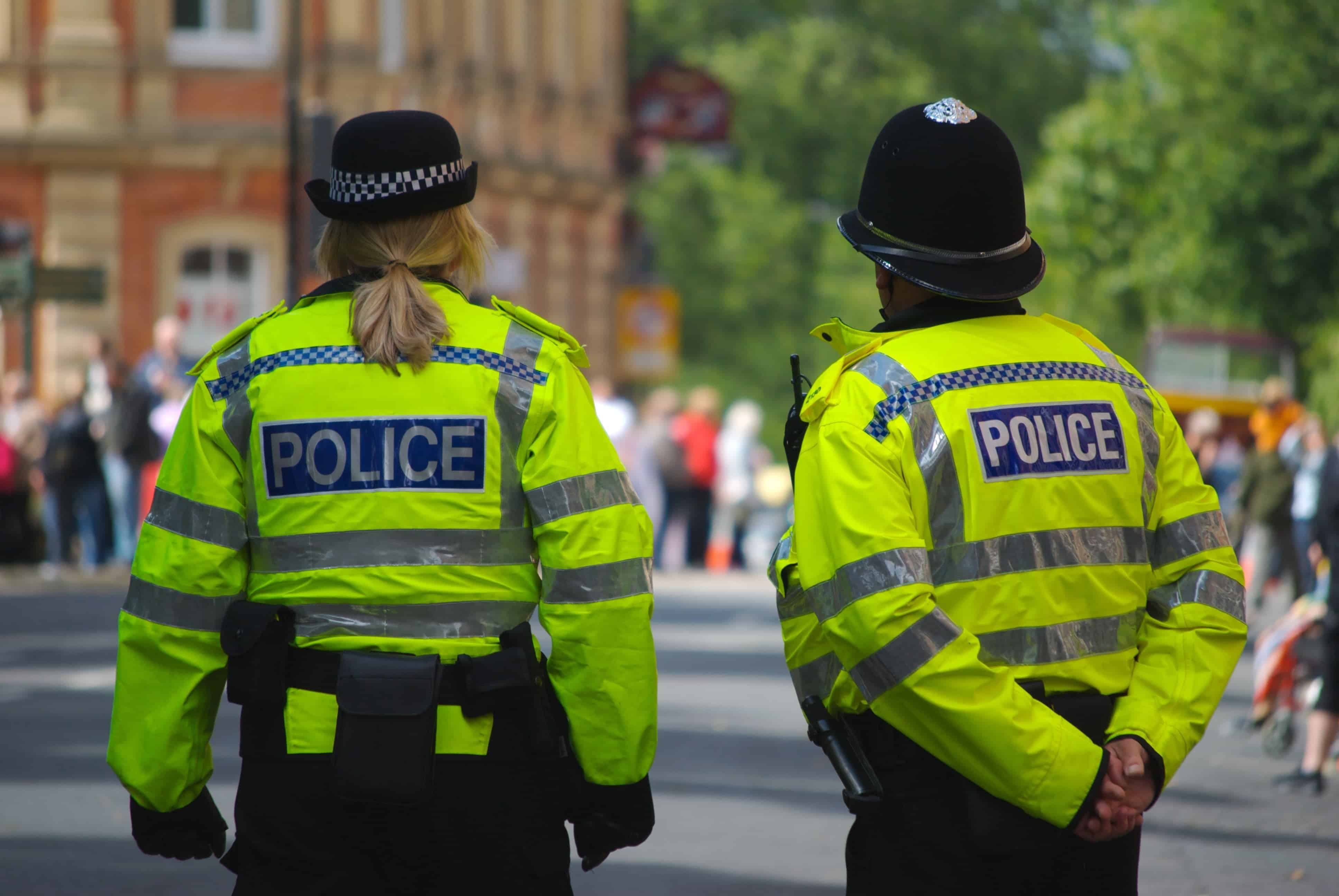
PLUS…BONUSES!

BONUS #1
150-Page Interview Skills Insider’s Guide
FOR A LIMITED PERIOD ONLY we are able to give you our powerful 150+ page ‘Interview Skills’ guide free of charge. It is the perfect guide to help you prepare for the tough Police interview!

- All of the most common (and not so common) interview questions you are likely to face broken down.
- Full and detailed answers to every question – ensure you always have the perfect answer!
- How to use the STAR method to come up with your own winning answers that match the experience, values, and skills the interview assessor is looking for.
- Created by interview panel experts and packed full of insider advice.
Important: This insider’s guide cannot be purchased individually anywhere else and is exclusively available as a limited-time bonus!
Worth £9.99, Yours FREE
BONUS #3
PLUS…30-Day Free Subscription Trial To The Online Police Officer Testing Platform!
As well as life-time access to the Police SJT workbook, this product also includes a 30-day free trial to our updated Police Officer Online Testing Suite (usually £9.99+vat per month).
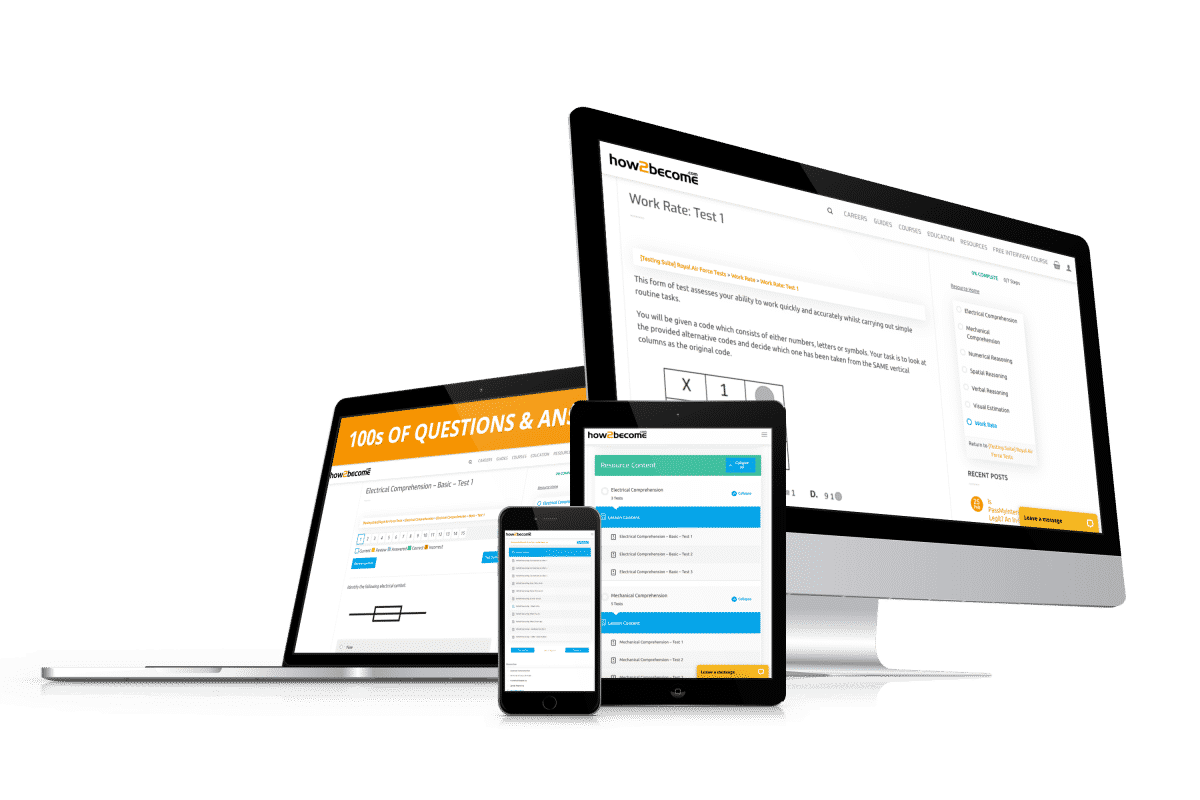
- 100s of Additional Questions on each element of the police assessment to help boost your scores!
- Practice all of the test questions under timed conditions using our online testing suite.
- Instant online access.
- Compatible on Mobiles, Tablets and Computers.
- Scores are tracked so you can focus on areas that need improvement.
Important: This powerful free trial costs £9.99 + vat every month for everyone else! You will get unrestricted access to all of the interactive online police test questions to give you the advantage right away.
Worth £9.99, Yours FREE for 30-days*
*We want you to know: This is a subscription service that is charged at just £5.95 + vat per month after the 30-day trial expires. No minimum term. You may cancel anytime by contacting info@how2become.com. If you cancel before the 30-day trial ends, you will not be charged. Please see our terms for full details.
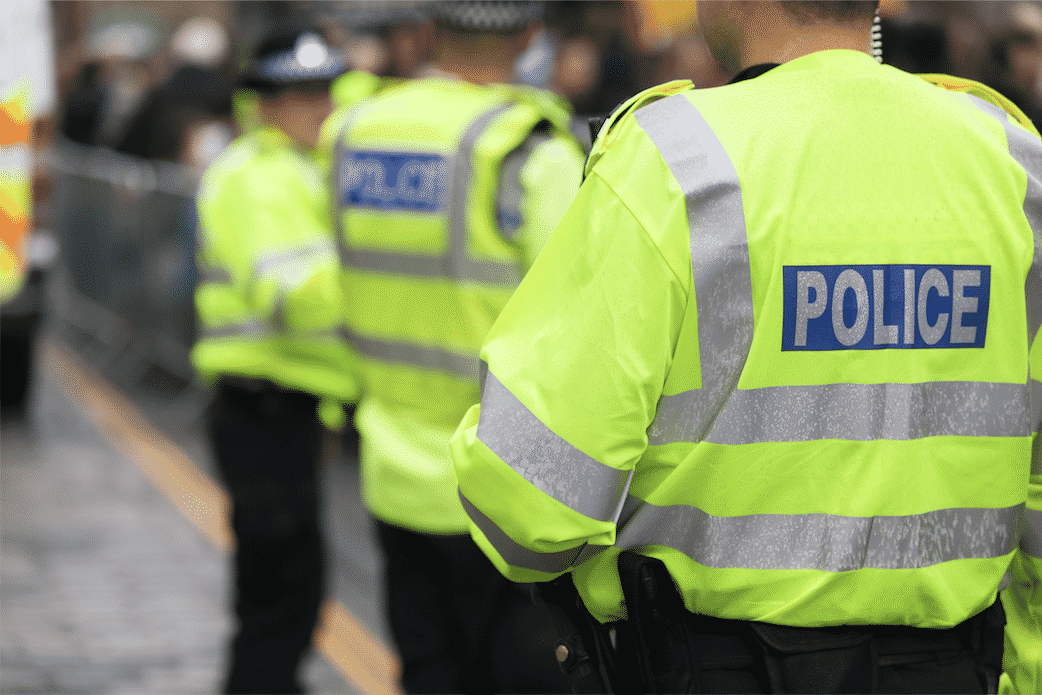
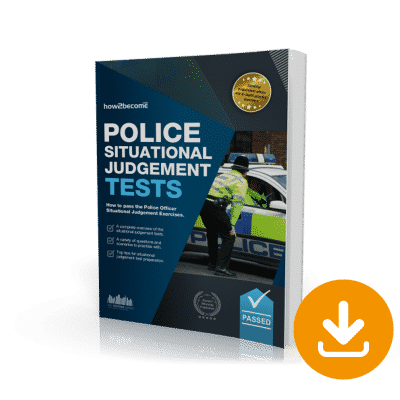
✓ 30-Day Money-back Guarantee
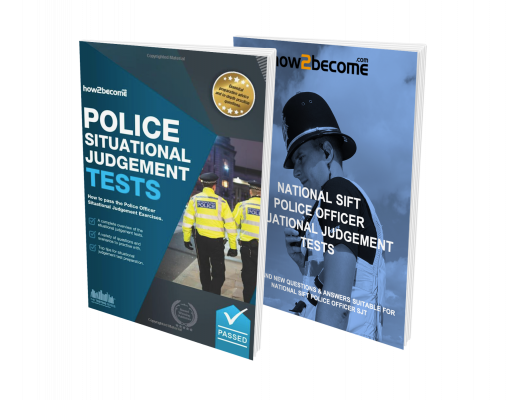
✓ 30-Day Money-back Guarantee
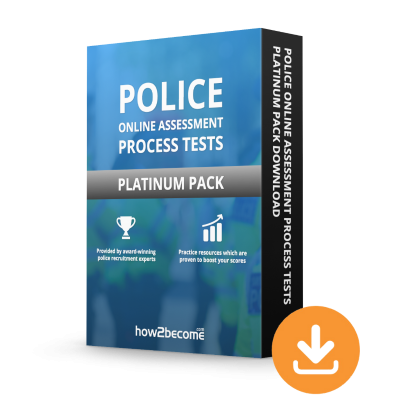
✓ 30-Day Money-back Guarantee
Did you know? All orders with How2Become are protected by our 30-day money-back guarantee. What ever the reason…or no reason at all…you can have your money back if this resource isn’t right for you (see our terms for full details).
WHY BUY WITH HOW2BECOME?

MONEY-BACK GUARANTEE
CREATED BY THE EXPERTS
PROVEN TRAINING
EXCLUSIVE FREE BONUSES
Firstly, these guides are created by us and our team of experts – we have all the answers to your questions and will help you succeed (like we’ve been doing for the last 16 years), we update our material frequently and you can contact us at any time with any questions you have.
Secondly, we provide exclusive bonuses with all our products that you won’t find anywhere else. These bonuses include free guides, powerful online testing suites and more!
Thirdly, are guides and training just work. Take a look at our TrustPilot page where you will see our rating of 4.9/5. There, our customers share their positive buying experiences and more importantly the time-saving success our resources have given them (hint: they passed their police assessment).
Finally, we have eliminated all risk for you. All of our online training resources are protected by our 30-day, no questions asked, money back guarantee. Whatever the reason…or no reason at all…you can have a full refund if this training isn’t right for you. So there is no risk.
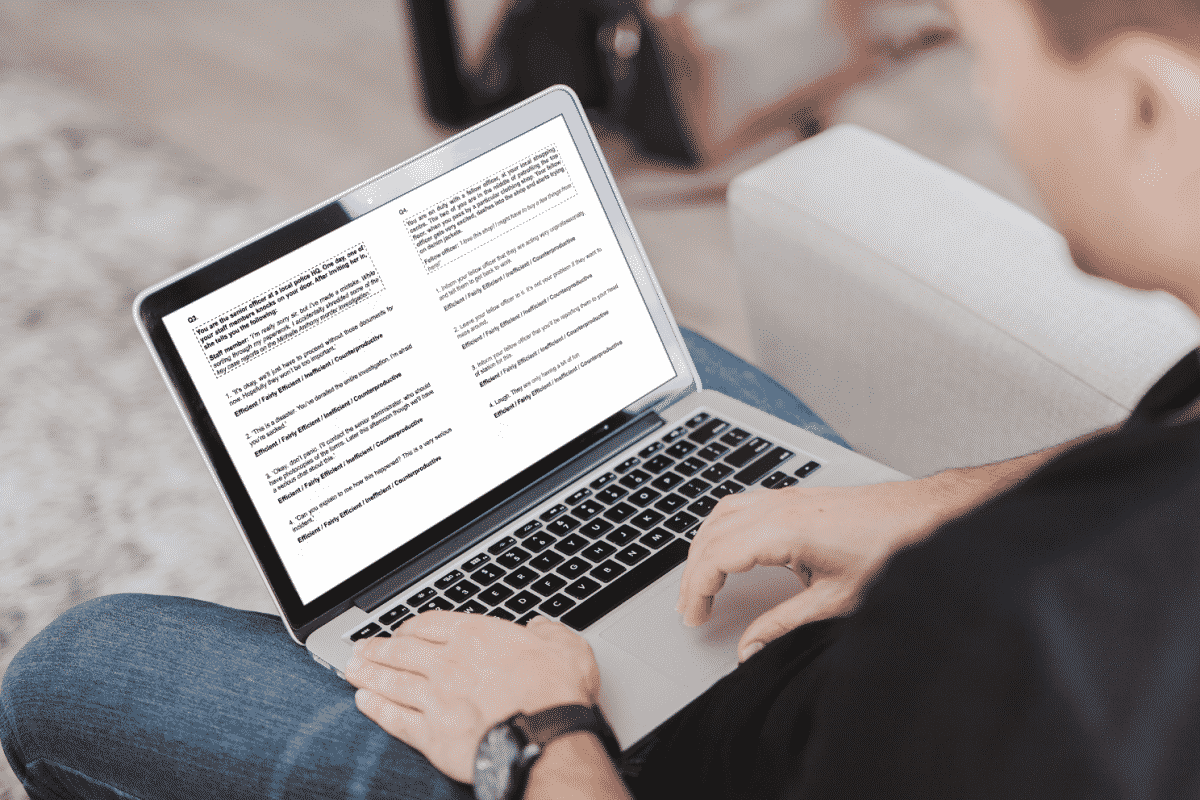
Learn how to PASS THE POLICE situational judgement TEST
We’ve helped 1000s of aspiring applicants in their journeys to join the police across not only the UK. Trust the UK’s #1 careers and education specialists to help you secure your role.
Get instant access »“Excellent book, this has really helped me to prepare for an upcoming assessment centre.
Allows you to get an idea of what to expect on the day and calms the nerves, would highly recommend to anyone looking at joining the job.” Steve B.














